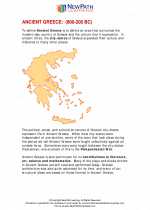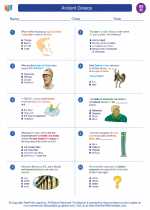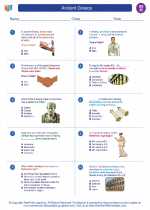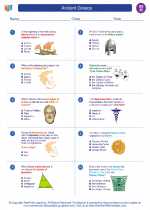Key Concepts in Metaphysics
- Ontology: Ontology is the branch of metaphysics that deals with the nature of being and existence. It asks questions such as "What is real?" and "What kinds of things exist?"
- Cosmology: Cosmology is the study of the origin and structure of the universe. It examines questions about the nature of time, space, and the universe as a whole.
- Epistemology: While epistemology is generally considered a separate branch of philosophy, it is closely related to metaphysics. It deals with the nature of knowledge and the ways in which we can know about reality.
- Mind-Body Problem: This problem within metaphysics explores the relationship between the mind and the body, and whether they are separate entities or if they are fundamentally connected in some way.
- Free Will and Determinism: Metaphysics also explores questions about free will and determinism, considering whether human actions are freely chosen or if they are determined by external factors.
Study Guide for Metaphysics
When studying metaphysics, it's important to engage with the fundamental questions and concepts that have been at the center of philosophical inquiry for centuries. Here are some key steps to consider in your study of metaphysics:
- Understand the Historical Context: Familiarize yourself with the historical development of metaphysical thought, including the contributions of ancient philosophers such as Plato and Aristotle, as well as the evolution of metaphysical inquiry in the modern era.
- Engage with Key Texts: Read primary sources by influential metaphysical thinkers, such as Descartes, Leibniz, Kant, and more recent philosophers like Martin Heidegger and David Lewis. Consider their arguments and how they have shaped the discourse in metaphysics.
- Explore Contemporary Debates: Investigate current debates within metaphysics, such as discussions about the nature of time, the existence of abstract objects, the concept of modality, and the nature of causation.
- Consider Interdisciplinary Connections: Recognize how metaphysical questions intersect with other disciplines, such as physics, psychology, and theology. Understanding these connections can provide a richer perspective on metaphysical issues.
- Critical Thinking and Analysis: Develop your critical thinking skills by analyzing and evaluating arguments made by metaphysical philosophers. Practice articulating your own ideas about the fundamental nature of reality and existence.
[Metaphysics] Related Worksheets and Study Guides:
.◂Social Studies Worksheets and Study Guides Eighth Grade. Ancient Greece
Study Guide Ancient Greece
Ancient Greece  Worksheet/Answer key
Worksheet/Answer key Ancient Greece
Ancient Greece  Worksheet/Answer key
Worksheet/Answer key Ancient Greece
Ancient Greece  Worksheet/Answer key
Worksheet/Answer key Ancient Greece
Ancient Greece 

 Worksheet/Answer key
Worksheet/Answer key
 Worksheet/Answer key
Worksheet/Answer key
 Worksheet/Answer key
Worksheet/Answer key

The resources above cover the following skills:
National Curriculum Standards for Social Studies (NCSS)
TIME, CONTINUITY, AND CHANGE
SOCIAL STUDIES PROGRAMS SHOULD INCLUDE EXPERIENCES THAT PROVIDE FOR THE STUDY OF THE PAST AND ITS LEGACY.
KNOWLEDGE - Learners will understand:
Key historical periods and patterns of change within and across cultures (e.g., the rise and fall of ancient civilizations, the development of technology, the rise of modern nation-states, and the establishment and breakdown of colonial systems).
National Center for History in Schools (NCHS)
Historical Thinking Standards
Historical Comprehension
Reconstruct the literal meaning of a historical passage.
World History Content Standards
Era 3: Classical Traditions, Major Religions, and Giant Empires, 1000 BCE-300 CE
The emergence of Aegean civilization and how interrelations developed among peoples of the eastern Mediterranean and Southwest Asia, 600-200 BCE.
The student understands the achievements and limitations of the democratic institutions that developed in Athens and other Aegean city-states.
The student understands the major cultural achievements of Greek civilization.
The student understands Alexander of Macedon’s conquests and the interregional character of Hellenistic society and culture.
Major global trends from 1000 BCE-300 CE.
The student understands major global trends from 1000 BCE to 300 CE.